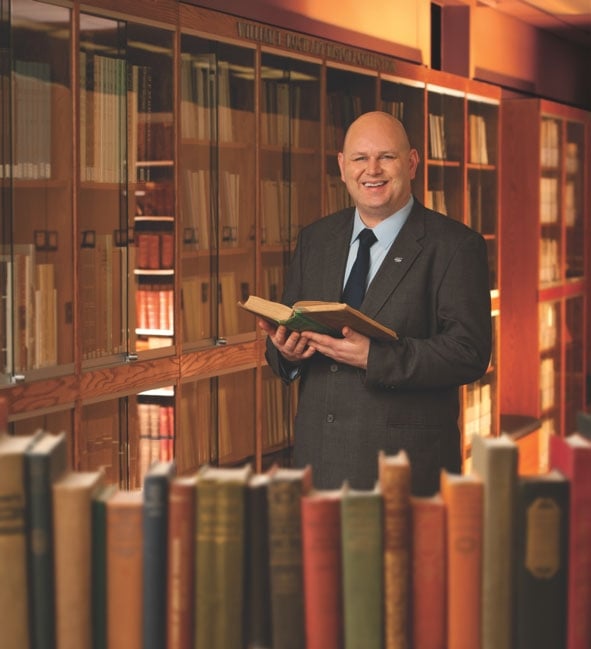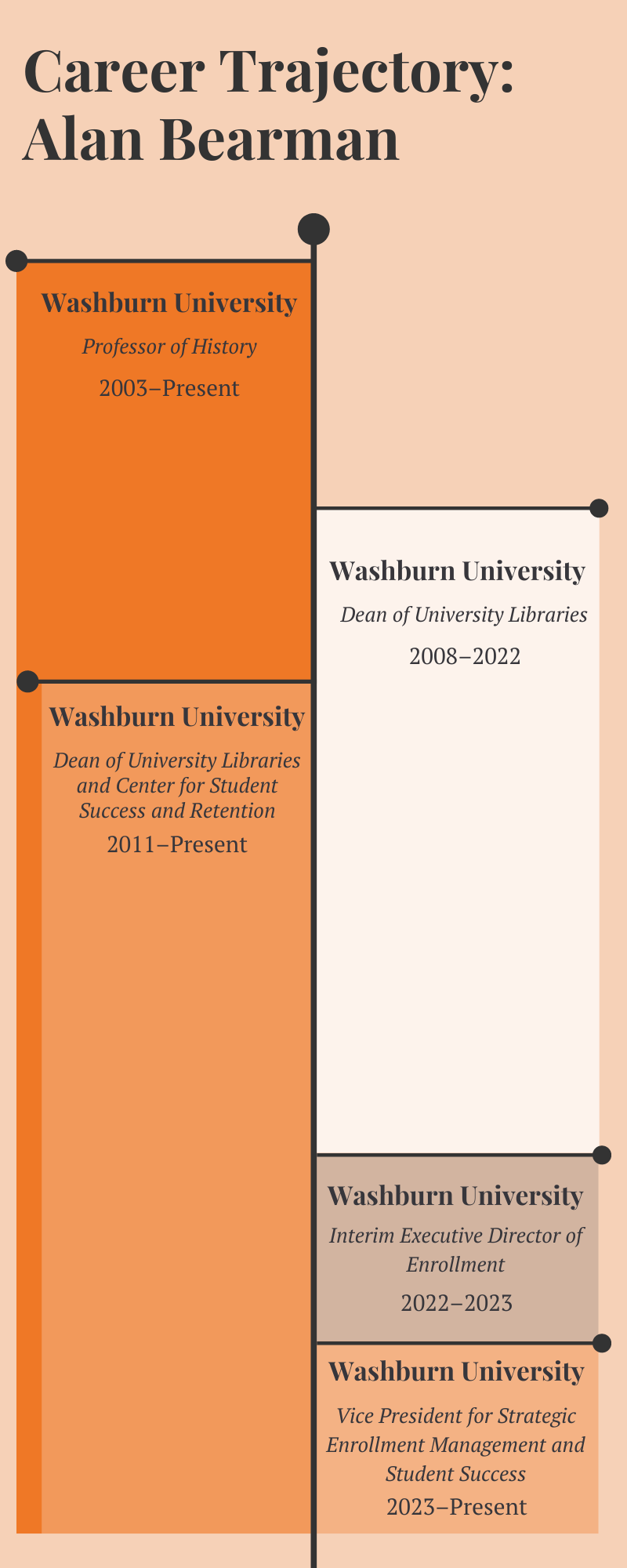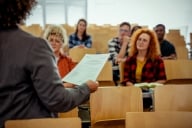You have /5 articles left.
Sign up for a free account or log in.

Alan Bearman started as Washburn University’s inaugural vice president for strategic enrollment management and student success in April.
Washburn University
For Alan Bearman, working in student success is about connecting students to their goals. A London native, Bearman has spent the past two decades in administration at Washburn University in Kansas, supporting students as dean of libraries and for student success and, since April, as the inaugural vice president for strategic enrollment.
Bearman spoke with Inside Higher Ed about his new role, support for first-generation students and the future of student success at Washburn.
Q: What led you to a career in higher education?
A: I’m originally from London, England. I grew up in the East End of London and came to high school in the United States when I was 15 and just never left.
I’m a first-generation, low-socioeconomic student. Every step of my life, I had a mentor who encouraged me to dream and try something new. I was always fairly good at school, so different mentors that would just [say], you know, “Do a little bit more, do a little bit more,” and one day you wake up and you fall in love with going to school, so I got a Ph.D. in the history of Christianity.
There was no master plan to go into a higher education. It was just kind of a fit, where my mentors kept saying, “You should consider this, you should consider this. I would encourage you [to do] that.”
I look back on my journey, and I’m just so thankful for those people who encouraged me to do something that was not ever really on my radar growing up, but then, also, to think about the way to kind of pass it forward: to kind of do what my mentors have done for me, which is to help young people try and find their place. At Washburn University, we’re pretty close to 50 percent first-generation. My wife is a first-generation college student, and every day I get to spend a lot of time with students who, honestly, remind me of my wife and I, first generation, just trying to find their place.
Q: How did you end up at Washburn?
A: There’s nothing in my life that has ever been planned out, you need to know that.
When I was at Murray State University in Western Kentucky working on my master’s degree in history, my then mentor Duane Bolin suggested that I consider studying with Bob Linder at Kansas State to get a Ph.D. in the history of Christianity. So I applied to Kansas State, was accepted, Bob accepted me as a student, so I came out to Kansas.
Washburn is in Topeka, Kan.—you drive 45 minutes west to get to Kansas State. And while I was working on my Ph.D., a job came open [at Washburn], assistant professor or instructor in early American history. My adviser, Bob, said, “Oh, you should apply for that while you’re finishing up your Ph.D.” I applied and got the job, and that was 20 years ago. I thought I’d be here for a couple of years.
I came to Washburn and just found a community of people really committed to first-generation student success, a place really committed to students, and 20 years later, I’m still here. I came to teach history, and then I became the interim dean of libraries by accident, and then I became the dean of libraries, and then I became the dean of libraries and student success. Now I’m vice president of [strategic enrollment].
Q: What is your new role and how does that fit into the larger institution?
A: [President JuliAnn Mazachek] and I had a conversation about something that, really, we had talked about on and off for years, which was creating a truly holistic student life cycle.
For years, we talked about what it would be like to have a truly holistic student life cycle? From first contact all the way through graduation, what would it be like if we didn’t have silos? What would it be like if we were able to build a life cycle truly focused on students, where they are every step in the journey? And that’s what she asked me to do is to build that life cycle. So that’s what we’re trying to do.

Ashley Mowreader | Inside Higher Ed
That means I have recruiting, admissions, registrar’s office, financial aid, marketing and advertising. That means I have student success and all the things that are part of that: academic advising, military success services, tutoring, testing and prior learning services. That means that I have the libraries, because we center so much of our work in the library. I think this is actually very important—we are attached to one of the university learning outcomes: information literacy. So everything we do is kind of done through the lens of information literacy, trying to help students really kind of become autonomous in many ways. But it’s a broad set of programs.
The idea is, how do you stitch them together in a way that they’re always available to the student at that moment when they need them? When are we going to be intrusive, when are we going to be passive and wait on students, but always trying to make sure we meet students where they are?
In all honesty, it’s a great deal of fun. I mean, there’s days where it can be a little stressful, but I work with an amazing group of people. I live two blocks from campus, so every morning when I walk to campus, I’m genuinely excited to come to work, because I work with such an amazing array of people who are so dedicated to student success. So even though we’re figuring out how to stitch all these things together, I don’t really worry about it because the people are so committed.
Q: How does your role of dean of libraries impact your student success work?
A: Library as place is more important than ever.
Now, we don’t check out nearly as many books as we did 10, 15 years ago. The history majors—my students—still check out a lot of books. But you know, in the sciences, they don’t check out books anymore; everything is digital for them.
The No. 1 student group that uses the library more than any other: nursing students. We provide them the group study spaces they need to work collaboratively as a team. No. 2, not far behind them, students from school of business—same reason, they work intensely in teams; the library provides them that place to gather and work as a team.
For first-generation students, it’s a place where we invite them in. We long ago moved away from stacks—you know, we’re no longer a physical repository of books. It’s a very welcoming space, a very relaxed space.
For those first-generation students, particularly the nonresidential first-generation students who have to work, who maybe has to go pick up a little sister from elementary school, for them, it’s a place where they can come and develop their identity as a scholar, as a student. Library as place is actually more important than ever.
So we’re trying to teach them how to be information literate in a digital age, you know how to find, manage, find good information, manage that information, use that information ethically, because to be autonomous, you have to be information literate.
A lot of that information literacy is digital, but library as place is more important than ever. Most of our student success services are in the library: academic advising is in there, our military student success is in there, testing and [prior] learning. We’re actually about to move it; we just built a new law school building. The old law school building is being vacated, and we’re about to consolidate even more—we’re going to move our current library into that building; we’re going to consolidate yet more of our student success services in there. It’s on kind of one edge of campus; we have good parking, because we think it will make life that much easier for the commuter student. But the idea is to really make it a one-stop success building. I’m going to put career services in there, run our TRIO programs out of that same space—we’re really going to try to bring all of our student success services together so you’re not wandering around looking for them.
Q: What is student success to you?
A: We want students to graduate. If students are going to take this leap in this … time with a lot of voices telling you the college is not worth it, our first goal was always helping students graduate … We want to help students graduate to maximize the return on their investment in the college education.
But we’re also very attuned to the fact that we want first-generation students to grow as individuals, to develop a level of autonomy and understanding of who they are.
It’s going to sound corny, but I want them to have a transformational experience, just like I had at Murray State University. I was transformed by my university experience … and every day, that’s what we’re trying to do is figure out how to help students have a transformational experience, just like I had. My president, Dr. Mazachek, she’s a first-generation college student, I’m first generation, a huge number of people who work alongside me are first generation. And I think when it comes down to it, we want them to graduate, and we want to have a transformational experience because we were transformed by university.
Seeking stories from campus leaders, faculty members and staff for our Student Success focus. Share here.








